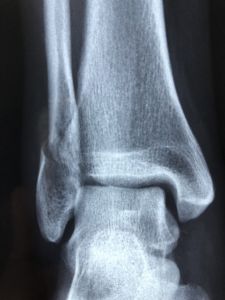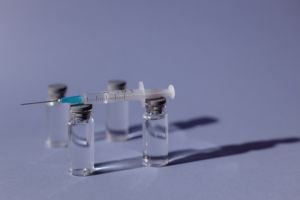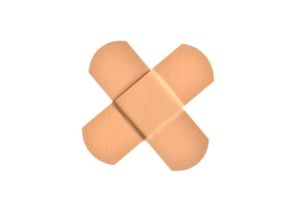
You may have seen hyaluronic acid listed as an ingredient on your facial moisturizer, but the benefits of this amazing substance are more than skin deep. Many patients with knee pain have found that hyaluronic acid injections can reduce pain, inflammation, and stiffness.
Are you struggling with knee pain caused by osteoarthritis but aren’t ready for knee replacement surgery? There are several alternative treatments on the market, but it can be challenging to sort through them and figure out which one is the best fit for you. This FAQ sheet aims to answer your questions about hyaluronic acid injections so you can make an informed treatment decision:

What is Hyaluronic Acid?
Hyaluronic acid is a chemical naturally produced by our bodies. It’s part of the fluid that helps to lubricate and cushion your joints. As we age, our bodies produce less hyaluronic acid. This may play a role in the development of osteoarthritis pain. Hyaluronic acid injections help to replenish this natural substance and lubricate knee joints.
You may have heard hyaluronic acid injections for knees referred to by different names, such as ha for knees or even “knee gel shots.” These refer to the same substance. HA (short for hyaluronic acid) is a clear, viscous substance, similar to a gel, but not usually as thick.
What Does Hyaluronic Acid Do?
Hyaluronic acid was first discovered in 1942. It was immediately apparent to scientists that they’d found a unique substance. Since then, hyaluronic acid has become one of the most heavily studied substances in medicine and has finally been harnessed as an effective treatment for several conditions.
Hyaluronic acid is hydrophilic, meaning that it attracts water. It can hold up to 1000 times its own weight in water. When it’s bonded with water, it forms a viscous fluid similar to motor oil. Hyaluronic acid is found throughout the human body and is responsible for lubrication, nutrient transfer, encouraging collagen production, and even giving shape to our cells. Certain areas of the body have exceptionally high quantities of hyaluronic acid. These include the eyes, joints, connective tissues, and skin.
Hyaline cartilage, the type of cartilage that covers the ends of your long bones, contains high amounts of hyaluronic acid. Your long bones include the bones that meet at your knee joint. Your joints, including your knee joint, are surrounded by a synovial membrane. This membrane secretes a substance known as synovial fluid. Thanks to its high concentration of hyaluronic acid, synovial fluid lubricates and cushions joints, protecting the ends of your long bones from the wear and tear of constant movement.
Just as motor oil becomes thin and less protective as it’s exposed to heat and wear, our synovial fluid also breaks down over time and becomes thinner. Renewing the hyaluronic acid in your joints helps to mitigate this problem and relieve the pain associated with osteoarthritis.
How do I Know if Hyaluronic Acid Injections are Right for Me?
Hyaluronic acid injections are typically recommended for patients with osteoarthritis-related knee pain that has not responded to over the counter pain relievers. It can help postpone the need for total knee replacement surgery. Chiropractors administer these injections, as do many other healthcare professionals. Making an appointment for an evaluation is the best way to know if you are a good candidate for the treatment.
What Should I Expect During and After the Injection?
When you come in for your injection, your healthcare provider will first perform an examination on your knee. They may need to use a syringe to remove excess fluid if the knee is very swollen. If this is the case, a pain-killing injection will be administered first. Then the hyaluronic acid will be injected into the joint.
There are several different brands of hyaluronic acid approved for injection. Some of these require multiple injections, and others only require one. No matter what brand you receive, pain relief will not be immediate. It takes about four weeks on average for the hyaluronic acid to form bonds that coat the cartilage and protect nerve endings. After the patient begins to feel relief, it usually lasts for three to six months. Some studies have shown that additional injections after the initial effects wear off can extend pain relief for up to three years in patients who had a good response to the first injection.
Are There Side-Effects?
Hyaluronic acid is a safe, natural treatment. Patients may experience mild swelling or soreness after the injection that goes away within a few days. Tell your provider about any allergies you have and if you have recently had an infection in your knee. The injection should not be administered to an infected knee. Hyaluronic acid injections have proven to be safe and effective. They may also delay the need for riskier procedures like knee replacement surgery.
How does Hyaluronic Acid Compare with Cortisol/Steroid Injections?
Cortisol injections are a common treatment for joint pain. These injections are usually very effective, but too much cortisol can have negative health impacts. For this reason, there is a limit to how many cortisol shots you can have in a given time period. Hyaluronic acid does not carry these health risks and is a good option for people who can’t have another cortisol shot but are still dealing with knee pain.
Another difference is that cortisol decreases inflammation, but it doesn’t help to lubricate the joint. Hyaluronic acid works to protect the cartilage from further damage, reduce inflammation and protect nerve endings.






